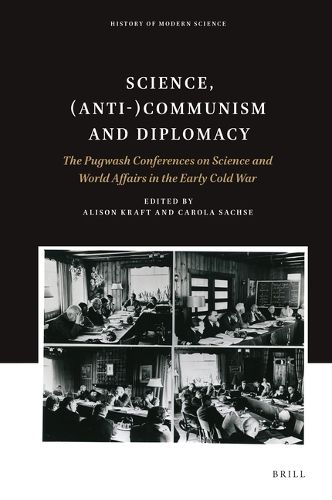Readings Newsletter
Become a Readings Member to make your shopping experience even easier.
Sign in or sign up for free!
You’re not far away from qualifying for FREE standard shipping within Australia
You’ve qualified for FREE standard shipping within Australia
The cart is loading…






From 1957 onwards, the Pugwash Conferences brought together elite scientists from across ideological and political divides to work towards disarmament. Through a series of national case studies - Austria, China, Czechoslovakia, East and West Germany, the US and USSR - this volume offers a critical reassessment of the development and work of Pugwash nationally, internationally, and as a transnational forum for Track II diplomacy. This major new collection reveals the difficulties that Pugwash scientists encountered as they sought to reach across the blocs, create a channel for East-West dialogue and realize the project’s founding aim of influencing state actors. Uniquely, the book affords a sense of the contingent and contested process by which the network-like organization took shape around the conferences.
Contributors are Gordon Barrett, Matthew Evangelista, Silke Fengler, Alison Kraft, Fabian Luscher, Doubravka Olsakova, Geoffrey Roberts, Paul Rubinson, and Carola Sachse.
$9.00 standard shipping within Australia
FREE standard shipping within Australia for orders over $100.00
Express & International shipping calculated at checkout
From 1957 onwards, the Pugwash Conferences brought together elite scientists from across ideological and political divides to work towards disarmament. Through a series of national case studies - Austria, China, Czechoslovakia, East and West Germany, the US and USSR - this volume offers a critical reassessment of the development and work of Pugwash nationally, internationally, and as a transnational forum for Track II diplomacy. This major new collection reveals the difficulties that Pugwash scientists encountered as they sought to reach across the blocs, create a channel for East-West dialogue and realize the project’s founding aim of influencing state actors. Uniquely, the book affords a sense of the contingent and contested process by which the network-like organization took shape around the conferences.
Contributors are Gordon Barrett, Matthew Evangelista, Silke Fengler, Alison Kraft, Fabian Luscher, Doubravka Olsakova, Geoffrey Roberts, Paul Rubinson, and Carola Sachse.